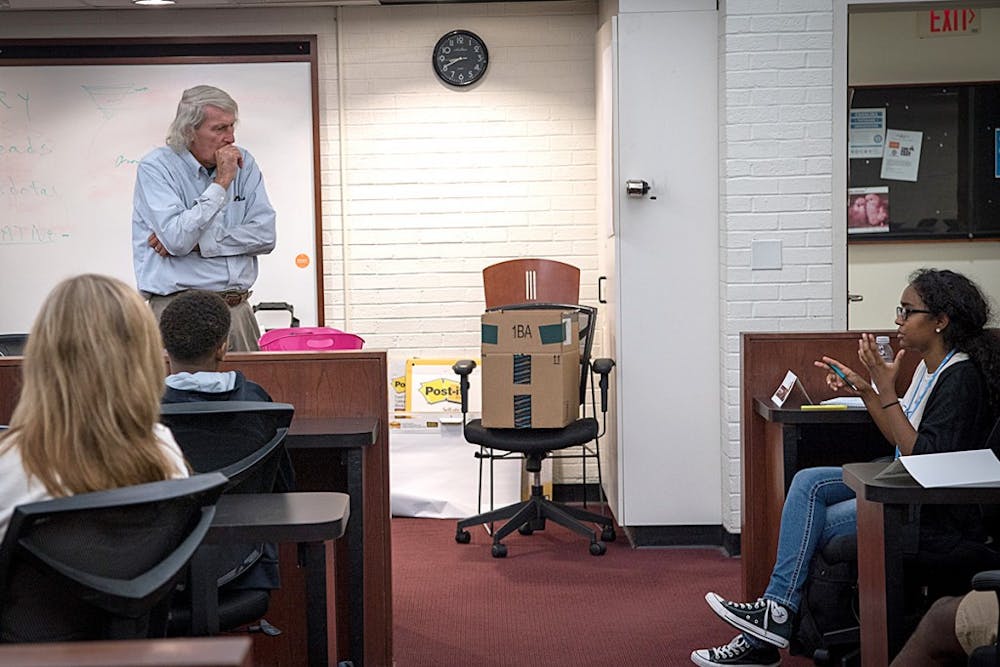“He cared deeply about being as accurate and thought-out as possible, but he was also very easy to work with,” he added.
That sentiment rang true in the fall of 1963, when Yopp reported on a Ku Klux Klan rally a few miles outside Chapel Hill, alongside then-staff photographer Jock Lauterer, who later became a photography professor at UNC.
Lauterer said he immediately felt scared as he saw white supremacists chant racist remarks in white robes and burn crosses. He protected himself behind Yopp’s 6-foot-4 frame and watched him confidently stand and jot down notes, all while several KKK members gave the two reporters dirty looks.
“Nobody was going to mess with (that) guy,” Lauterer said. “He exuded that sort of confidence in our role and our right to be there of course as well, but I was just scared to get beat up.”
After graduating from UNC, Yopp became a reporter for The Raleigh Times, where he eventually became the paper’s managing editor until it ceased printing in November 1989.
The paper merged with the N&O, where Yopp became the managing editor.
Although Yopp's work was primarily behind the scenes, Ferrel Guillory, a retired professor at the UNC Hussman School of Journalism and Media, said his work helped the paper churn accurate and well-written content for decades.
“He’s the kind of important journalist that most people, most readers of (the N&O), never knew,” Guillory said. “They didn’t know his name, but he was critical to ensuring that they would read a credible newspaper in the morning.”
Guillory was surprised when Yopp’s wardrobe changed upon becoming a professor at UNC about 20 years ago. He traded Oxford ties and blazers for casual sweaters and button-down shirts. His hair, which used to be short, almost grew to his shoulders at times and would sometimes be wrapped up in a ponytail.
Yopp began teaching news writing and reporting as an adjunct professor at UNC. Students saw him as a professor with a detailed eye for grammar, punctuation and AP Style.
“It felt like it was just a harsh-spirited teacher, but actually he was just trying to prepare us for the real world as best he could,” said Caroline Bass, who took Yopp's class in 2015 and now works as a policy analyst.
That strictness inspired other professors, like Hussman School of Journalism and Media colleague John Robinson.
To get the day's news and headlines in your inbox each morning, sign up for our email newsletters.
During his first semester teaching nine years ago, Robinson said he asked Yopp how many As he gave out on assignments per class. He responded that only gave them to a few students.
“You’ve got to make them earn it because once they get out in the real world, they're going to have to earn it, so they might as well start now,” Robinson recalled Yopp saying to him.
He said that moment has guided his values as a professor at UNC.
“I don't think that I realized until a couple of weeks later, when I actually said, 'I'm going to be harder on the students and be a stricter grader,' that it really made sense to me how important it was to hold a higher standard for students than I was at the time,” Robinson said.
Yopp carried a signature calm, soft-spoken disposition as well. In class, Bass said it wasn’t uncommon for peers to ask him to speak up because they couldn’t hear him. When walking around campus or through Carroll Hall, he always took his time, Bass said.
“He never rushed you or never really rushed anywhere,” Bass said.
He also taught classes for the Chuck Stone Program for Diversity in Education and Media alongside his wife, Jan Yopp, who co-founded the program. The program aims to help students from diverse backgrounds build newsroom experience and connect with mentors.
“It really meant a lot to him to have such diverse students,” Livis Freeman, a principal coordinator of the program, said. “He was a champion for diversity along with his wife before it was a fashionable thing, and he was one of those people who genuinely meant it.”
Hanna Wondmagegn, a photojournalism student at UNC, said she picked up a camera for the first time during the program in 2015. That experience helped launch her passion for photojournalism.
“... Not knowing that photojournalism would be my calling,” Wondmagen said in a tweet last week. “It’s only right that my 1st ever set of photos came from that week. I’m so grateful for the wisdom he passed along & for inspiring me to pursue a life in journalism.”
@heidi_perez02
university@dailytarheel.com




